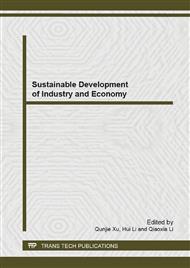p.773
p.777
p.781
p.786
p.791
p.796
p.803
p.808
p.813
The Analysis on the Countermeasures of Contemporary Ecological Environment Issues Affecting the Construction of Peoples Livelihood
Abstract:
On the contemporary, human beings are facing serious environmental problems. The Environmental system in which human beings are living and the construction of peoples livelihood is not two mutually fragmented systems. The problems of ecological environment have many important implications on the contemporary peoples livelihood, affecting a country's social stability and public political participation. For this effect, our government should actively response to it. With the guidance of scientific development view, we should strengthen the treatment of ecological environment, coordinate the conflicts of environmental interest fairly, unimpeded channels to promote active participation in the public environment, strengthening international environmental cooperation and exchanges so as to make the treatment of ecological environment and the construction of peoples livelihood to achieve the progress and development.
Info:
Periodical:
Pages:
791-795
Citation:
Online since:
December 2013
Authors:
Price:
Сopyright:
© 2014 Trans Tech Publications Ltd. All Rights Reserved
Share:
Citation:


